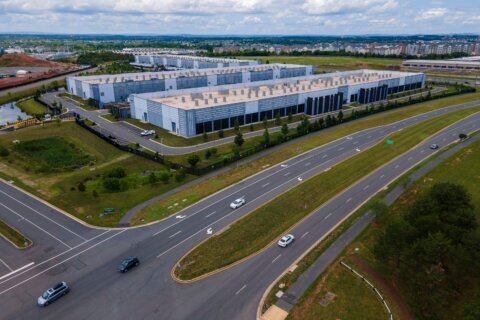This article was republished with permission from WTOP’s news partner InsideNoVa.com. Sign up for InsideNoVa.com’s free email subscription today.
After a more than 27-hour meeting, the Prince William Board of County Supervisors on Wednesday approved the PW Digital Gateway, allowing construction of what’s expected to become the largest data center corridor in the world.
The project, 23 million square feet of data centers on roughly 2,100 acres along Pageland Lane in western Prince William near Gainesville that will be built out over the next two decades, was given the green light by the board’s Democratic majority with all Republicans dissenting. The final vote in favor was 4-3, with Democratic Supervisor Kenny Boddye of the Occoquan District abstaining.
Boddye previously voted in favor of a motion to the deny the rezonings, but that failed on a 4-4 tie. He then sought, and received, a reduction in the amount of data center space that can be built on the southern-most portion of the site, closest to Manassas National Battlefield.
Ultimately, the project was approved despite widespread public opposition and recommendations for denial from both the Prince William County Planning Commission and the county’s professional planning staff.
Authorization of the Digital Gateway is the culmination of years of maneuvering, beginning in 2019 with a group of Pageland Lane residents pitting neighbors against one another to assemble and sell their properties to data center developers to clear the land in exchange for large payouts.
The proposal has been the subject of exacting public discourse in the county, having influenced public policy and also helping to decide the outcome of local elections, with Democratic Chair Ann Wheeler being ousted in her party’s primary earlier this year over anti-data center sentiment.
The decision came after more than 27 of public comment and hearings with county staff and developers. The board’s vote is all but certain to spawn legal challenges from opponents. One advocacy group has already threatened litigation, a warning the board’s attorney deemed probable.
The board’s Democratic majority of Wheeler, Woodbridge Supervisor Margaret Franklin, Neabsco Supervisor Victor Angry and Potomac Supervisor Andrea Bailey supported the proposal. Coles Supervisor Yesli Vega, Brentsville District Supervisor Jeanine Lawson and Gainesville Supervisor Bob Weir — all Republicans — opposed the project.
During the hearing, representatives with QTS Realty Trust Inc. and Compass Datacenters, the companies behind the project, made their case to the supervisors as to why their rezoning applications should be approved in the face of overwhelming rejection from two authoritative government institutions.
Staff members, meanwhile, defended their recommendations for denial on the bases that the data center developers haven’t done enough to remedy what officials continue to believe are substantial deficiencies in the applications.
The Democratic majority backed the Digital Gateway from the outset, arguing it will be a boon for commercial tax revenue — it’s projected to generate up to $400 million each year once built out. Smaller amounts of revenue are expected in the immediate years once construction begins. The data centers are also expected to generate some amount of jobs, another enticing factor for Democrats.
Under Democrats, the board in 2022 approved a substantial amendment to the county’s Comprehensive Plan intended to pave the way for the Digital Gateway by allowing more dense development on the county’s western end — the so-called rural crescent.
Deciding the Digital Gateway will be among Wheeler’s final moves in office before she’s replaced by Democratic Chair-elect Deshundra Jefferson, a data center critic who’s vowed to put a pause on approvals of most new tech developments once sworn in early next year.
The project was a nonstarter for the board’s Republican minority. They maintained it’s a threat to rural living on the county’s western end and an environmental wrecking ball for the nearby state and national parks, claims that have been backed by the county’s professional planning staff, environmental advocacy groups and the U.S. National Parks Service. Republicans sided with county staff, arguing the proposal was severely undercooked and in need of more time in the oven.
They also expressed frustration with the quick turnaround between the Dec. 7 issuance of the planning staff’s updated opinions on the project and Tuesday’s meeting, suggesting there wasn’t enough time for them to review such an abundance of new information. The developers in November re-submitted project applications to Prince William County leaders in response to the county’s planning staff in October rejecting their initial plans, prompting staff in advance of the hearing to rush out the door updated analyses that total thousands of pages.
After Wheeler and other Democrats grew tired of Weir, whose district includes the project area, and Lawson grilling county staff and developers, the board moved to limit supervisors’ questioning time in the name of accelerating the hearing.
The hearing drew hundreds of residents. Opponents echoed concerns raised by Republicans and county staff, while those in favor touted the Digital Gateway as a one-in-a-lifetime opportunity for the county to boost its tax base and increase work opportunities for unions and laborers. At one point Tuesday night, a woman broke out in song opposing the project, generating applause outside the board chambers that led Wheeler to call a brief recess to regain order.
While county planners acknowledged the developers have taken strides to improve some portions of the applications through the approval process, staff continued to question the volume of critical information being withheld, such as details about what specifically will be built and where. Staff objected to the developers’ lack of a building footprint or site layout for each application, which they say will make the plans difficult to enforce.
Staff maintained the Digital Gateway would be environmentally unfriendly, threaten the county’s historic resources and be out of compliance with the Comprehensive Plan.
The disconnect between staff and the developers stemmed from county planners’ opposition to the amount of flexibility the companies gave themselves in the proposal to modify their plans. Under the current proposal, staff say it will be difficult to hold the developers accountable for their design of any buildings given the lack of specificity. Staff nailed each application for not including elevations for the roughly 30 proposed data center buildings. Staff said it would be improper to grant rezonings given the uncertainty of the developers plans.
But representatives from the companies maintained, as they have in the past, their need for such flexibility to meet the evolving needs of clients that will make use of space inside the data centers and allow them to adjust the buildings as they are built over the next two decades to keep up with rapidly evolving cloud computing and the supplemental technologies that support it.
The applicants also did not provide information on the proposed location of electrical infrastructure that will serve the facilities in each land bay, such as transmission lines, all sticking points contributing to staff opposition.
The developers said knowledge of power line locations was out of their control and in the hands of energy companies that will power the stations. Representatives with electric companies said they won’t decide on power line locations until after the application was approved.
Staff acknowledged there is no legal requirement for the developer to show where power lines will be placed, but they insisted it was their professional recommendation that possessing location information would be in the public’s best interest for a project of this magnitude.
The rush to move the applications along through the approval process stems from deadlines the developers’ say they must meet. The political realities surrounding the project are also inescapable.
The board’s Democratic majority will hold into next year, but Jefferson, the incoming Democratic chair, has been a staunch opponent of the project and vowed to take steps to mitigate it and other similar data center projects once in power.
Her ascendance, paired with Republican opposition to the project, could have killed the project were a vote pushed to January. Jefferson, along with state Sen.-elect Danica Roem and Del.-elect Josh Thomas, all Democrats, issued a statement Tuesday morning reiterating their opposition to the Digital Gateway and urged the board to oppose it.
“Thirty-three environmental groups raised significant issues regarding the environmental impact of this proposal, and the Planning Office and Planning Commission have both recommended that this project not go forward due to concerns regarding energy usage, impact on the ecosystem, and effect on our historical landmarks,” the officials said.
After more than 20 hours of discussion and public comment that began Nov. 8 and ended the following day, the county’s Planning Commission voted to recommend supervisors deny the project.
The rapid track on which the Digital Gateway was placed for approval has also taken a toll on the Prince William County Planning Office. Several other county agencies prioritized it over other projects, planning staffers said during the hearing.
The planning office has spent much of the year backlogged on work and short-staffed without consistent leadership while working through the Digital Gateway and other large applications with developers.
In their most recent attempt to kill the proposal, Republican officials and anti-data center activists on Monday pushed for the delay of Tuesday’s public hearing, threatening to sue by arguing the county did not follow state law regarding advertising the meeting in a newspaper.
Shortly after Tuesday’s meeting began, the board entered closed session to consult with legal counsel about “probable litigation.” When they returned, Republicans once again mounted a movement to postpone the hearing given the legal threats, but couldn’t get Democrats to join them.







